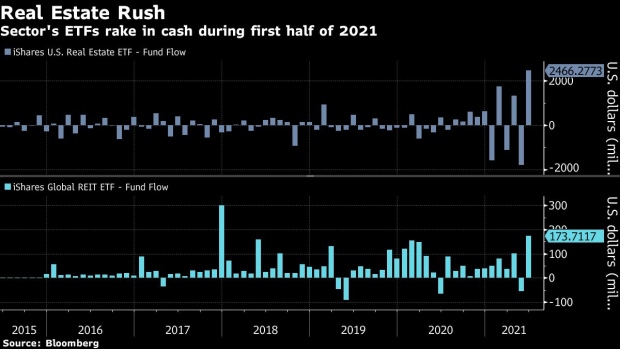Jun 25, 2021
Billions flood into real estate ETFs with property boom raging
, Bloomberg News
The imbalance between supply and demand continues to prop up housing prices across Canada
Raging real estate prices have sent investors pouring into exchange-traded funds tracking the industry’s gains.
The sector’s ETFs are on pace for their best month of inflows since at least 2014, with almost US$3.9 billion added, according to data compiled by Bloomberg.
BlackRock’s iShares U.S. Real Estate ETF (IYR) has already taken in US$2.5 billion in June, putting it on track for its best month ever. Another BlackRock fund -- the iShares Global REIT ETF (REET) -- is headed for its best month of inflows since 2017.

Historic stimulus measures by central banks around the world and an economic recovery that’s gaining speed are pushing up prices in every corner of the real estate market, fueling what some worry is becoming a bubble. As workers start coming back to the office, shoppers re-enter stores and restaurants start filling up, the demand for a wide range of proprieties is rising.
“The gains within the real estate sector have been broad based,” said Todd Rosenbluth, head of ETF and mutual fund research at CFRA. “Real estate is a sector that is well tied in with the reopening of the U.S economy as COVID begins to fade into the distance.”
Many of the category’s products, which invest heavily in real estate investment trusts, are outperforming broad-based indices. Vanguard’s Real Estate ETF (VNQ) and BlackRock’s IYR have each gained about 20 per cent this year, compared to 13.6 per cent for the S&P 500.
Mohit Bajaj, director of ETFs at WallachBeth Capital, said part of the inflows are also due to the hunt for yield amid rock-bottom rates.
“It seems like the Fed might be raising rates but not anytime soon, so real estate and housing-development companies should bode well in lower interest-rate environments,” he said.
Issuers are rushing out new products to capitalize on the boom. Janus Henderson Group launched the actively managed U.S. Real Estate ETF (JRE) earlier this week, and American Century recently filed for an Avantis Real Estate ETF with the ticker AVRE.
“They got lower yields, better earnings and higher inflation in the second quarter,” said John Augustine, chief investment officer at Huntington National Bank. “For real estate, that’s kind of a trifecta.”





